India’s corporate landscape is undergoing a quiet revolution. The torch is passing to Generation Z—those born between 1997 and 2012—who are bringing fresh energy, unconventional expectations, and a digital-first mindset into workplaces across the country. As this generation begins occupying crucial positions in organisations, they’re not just working—they’re reshaping work itself. The arrival of Gen Z signals a profound shift in professional values, technological expectations, and workplace culture. For businesses aiming to attract, retain, and inspire this growing talent pool, traditional HR processes won’t suffice. The future is here, and it demands smarter, more intuitive systems. That’s where a smart HR solution like HR Software in India becomes a key strategic asset. In this context, SFT Evolve stands out as an innovative, Gen Z-ready HRMS poised to redefine the employee experience.
What’s It Actually in a Generation?
A generation refers to a group of people born and living around the same time, who often share similar cultural experiences, values, and societal influences. But it’s not just about age—it’s about shared context.
Defining a Generation:
- Period: Typically spans 20–30 years, allowing children to grow up, become adults, and start their own families.
- Shared Events: Generations are shaped by major historical, technological, and social events—think wars, recessions, revolutions, or the rise of the internet.
- Cultural Identity: Each generation develops its unique slang, fashion, music, and attitudes, often in contrast to those of the preceding generation.
For example, Gen Z (born ~1997–2012) grew up with smartphones and social media, while Baby Boomers (born ~1946–1964) were shaped by post-World War II optimism and the civil rights movements.
Generational Names & Timeframes:
| GENERATION NAME |
BIRTH YEARS |
DEFINING TRAITS |
| Greatest Generation |
1901–1927 |
WWII, resilience, frugality |
| Silent Generation |
1928–1945 |
Conformity, discipline, post-war growth |
| Baby Boomers |
1946–1964 |
Optimism, activism, economic expansion |
| Gen X |
1965–1980 |
Independence, skepticism, tech adoption |
| Millennials (Gen Y) |
1981–1996 |
Digital natives, purpose-driven |
| Gen Z |
1997–2012 |
Social justice, tech fluency, diversity |
| Gen Alpha |
2013–2024 |
AI natives, screen-first learning |
| Gen Beta |
2025–2039 |
Emerging—expected to be hyper-connected |
These labels help us understand generational shifts, but they’re not rigid. People on the cusp of two generations often share traits from both.
Why Generations Matter in Workforces?
Understanding generations helps:
- Marketers tailor products and messaging
- Educators adapt teaching styles
- Employers manage diverse teams
- Policymakers address age-specific needs
It’s also a way for individuals to find identity and community in a rapidly changing world.
Also Read: Why Businesses Are Switching to Cloud-Based Employee Performance Management Systems in Kolkata
Who Are the Gen Zs Redefining Workplace Norms?
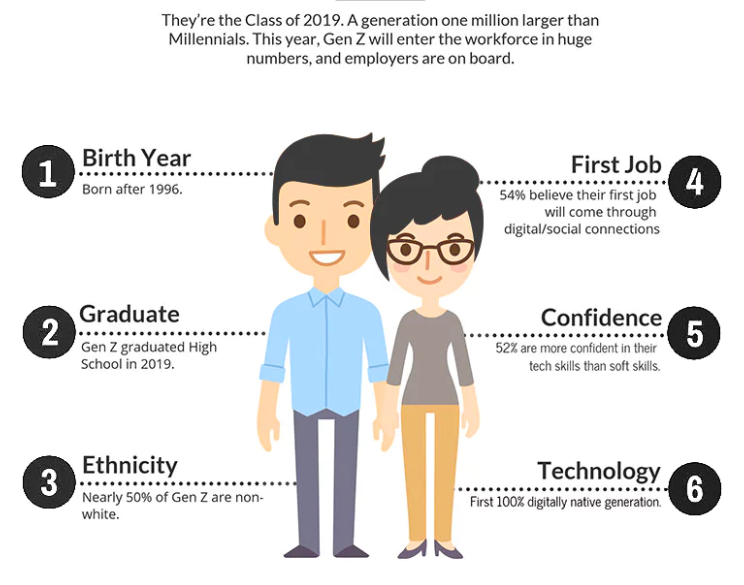
Source: Tagbox.com
Born between 1997 and 2012, Gen Z is the newest generation in the workforce. Gen Z has been shaped by uncertainty and disruption—including digital growth, global events, and economic shifts—yet craves stability and brings a strong sense of authenticity and purpose to their roles. Their upbringing during global recessions, climate crises, and rapid tech evolution has shaped a unique professional identity. Before we explore how Gen Z is influencing the corporate world, let’s understand what makes them different:
Defining Traits:
- Digital Natives- Gen Z is highly proficient in technology, with a preference for mobile apps, instant messaging, and cloud-based platforms for work. They expect intuitive, modern tools and dislike outdated systems.
- Purpose-Driven- They seek jobs that align with their values—social justice, sustainability, and ethical business practices matter more than just salary.
- Nonlinear Careerists- Prefer flexibility, gig roles, and skill-based growth over linear promotions.
- Valuing values- Gen Zs expect companies to show, not just tell, how they support people and the planet. This needs to be communicated in a way that resonates with them on channels they follow. Diversity, equity, and inclusion are very important, and Gen Zs want their employers to care about the planet.
- Mental Health & Work-life Balance Advocates- Gen Z prioritises emotional wellbeing. They expect mental health support, flexible schedules, and psychologically safe environments.
- Diversity & Inclusion Champions- This generation values representation and equity. They expect inclusive language, diverse teams, and transparent DEI policies.
- Feedback-Oriented- Gen Z thrives on real-time feedback and continuous learning. They prefer agile performance reviews over annual evaluations.
- Entrepreneurial & Independent- Many Gen Zers pursue side hustles or freelance gigs. They value autonomy and often challenge traditional hierarchies.
Generational Influences in Workplaces
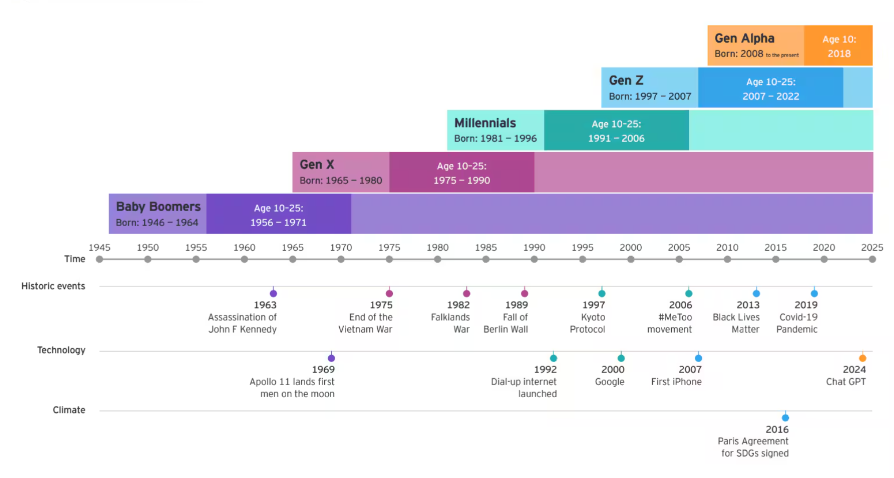
Source: E & Y
- Collaborative Yet Informal0- They favour flat structures and informal communication styles—often using emojis, GIFs, and shorthand in professional chats.
- Hyper-Connected- Use communication platforms like Slack, Discord, and WhatsApp as naturally as breathing.
Challenges Employers Face with Gen Z
While Gen Z brings innovation and energy, they also present unique hurdles for organisations:
- Tech Expectations vs. Reality- They expect seamless tech experiences, but many workplaces still rely on legacy systems. This mismatch can lead to frustration and disengagement.
- Mental Health Sensitivity- Gen Z is more vocal about burnout and stress. Employers must proactively support mental health to avoid high employee attrition.
- Communication Gaps- Their informal style can clash with the expectations of older generations for professionalism, leading to misunderstandings.
- Low Tolerance for Bureaucracy- Gen Z dislikes rigid hierarchies and slow decision-making. They want transparency and quick action, which can challenge traditional leadership models.
- High Turnover & Job-Hopping- They’re not afraid to leave if their needs aren’t met. Lack of growth, poor culture, or misaligned values can trigger early exits.
- Lack of Clarity in Career Paths- Without visible growth opportunities, Gen Z may disengage. They want clear roadmaps and mentorship, not vague promises.
- Workplace Loneliness- Remote work has made Gen Z the loneliest generation in the workplace. They crave connection, but often lack the tools or spaces to build relationships.
- Misaligned Expectations- Some Gen Z employees expect rapid promotions or leadership roles without understanding organisational dynamics.
How Employers Can Adapt?
To engage Gen Z effectively, organisations should:
- Invest in modern HR software in India and mobile-first platforms
- Offer mental health resources and wellness programs
- Create inclusive cultures with visible DEI efforts
- Provide structured feedback and mentorship
- Design clear career progression paths
- Encourage team bonding and social interaction—even in remote setups
In India, Gen Z represents one of the most diverse and ambitious cohorts yet, with expectations that challenge employers to evolve their policies, tech, and culture.
Gen Z’s Impact on the Indian Workplace
Let’s break down some transformational shifts Gen Z is bringing:
Hybrid & Remote Work Isn’t a Perk—It’s a Standard
Many Gen Z employees view remote and hybrid models as non-negotiable. They expect:
- Work-from-anywhere capabilities
- Flexible hours with productivity-based assessments
- Digital collaboration tools
Purpose Over Paycheck
Gen Z actively seeks roles that have an impact. Employers must demonstrate:
- Clear mission statements
- Social and environmental contributions
- Opportunities for meaningful work
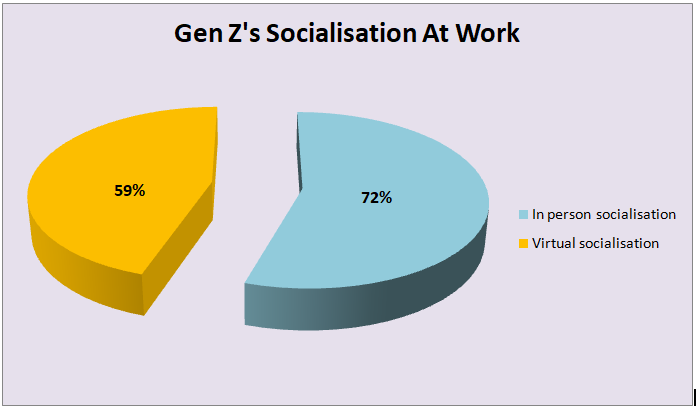
Source: Gen Z in Workplace, Survey by TalentLMS and BambooHR
Mental Health & Wellness Are Core Priorities
Workplaces in India must now:
- Offer mental health resources
- Promote work-life balance
- Foster psychologically safe environments
Continuous Learning & Feedback Culture
This generation thrives on:
- Microlearning platforms
- Frequent performance check-ins
- Real-time feedback and recognition
Tech-Enabled Everything
From onboarding to exit interviews, Gen Z expects:
- Mobile-first HRMS
- Self-service portal
- Smart automation
Challenges Faced by Indian Employers
Even forward-thinking companies in India are encountering hurdles:
- Generational Misalignment: Managing expectations across Gen X, Y, and Z requires nuance.
- High Attrition: Gen Z’s appetite for growth can lead to frequent job-hopping.
- Culture Shift Resistance: Established firms struggle with reimagining hierarchical systems.
- Infrastructure Limitations: Legacy HR systems can’t support distributed workforces or personalised experiences.
What HRMS Must Deliver to Meet Gen Z’s Demands?
Modern-day HRMS (Human Resource Management Systems) have evolved far beyond basic payroll and attendance tracking. To meet the demands of today’s dynamic, hybrid, and multigenerational workplaces, a robust HRMS should offer a blend of automation, personalisation, compliance, and analytics. To meet these challenges, modern HR Software in India must include:
Also Read: Best HRMS Software in Kolkata for Startups & SMEs: A Comparison Guide On the Must-Have Features
Core Functionalities:
- Employee Database Management- HR Software in India enables centralised, secure storage of employee records including personal details, job history, and compliance documents.
- Payroll Automation- Accurate salary calculations, tax deductions, and statutory compliance (PF, ESI, TDS) with real-time reporting.
- Time & Attendance Tracking- Integration with biometric devices or mobile apps for clock-ins, leave balances, and overtime calculations.
- Leave & Holiday Management- Customisable leave policies, automated leave approvals, and calendar syncing.
- Recruitment & Applicant Tracking- End-to-end hiring workflows from job posting to onboarding, with resume parsing and interview scheduling.
Advanced Capabilities:
- Onboarding & Offboarding Automation- Digital document signing, welcome kits, training schedules, and exit formalities with feedback capture.
- Performance Management- Goal setting, 360° feedback, appraisal cycles, and real-time performance dashboards.
- Learning & Development (L&D)- Integration with LMS platforms, personalised training paths, and certification tracking.
- Employee Self-Service Portal- Mobile-friendly access to payslips, leave requests, benefits, and profile updates.
- Compliance Management- HR Software in India provides alerts for labour law updates, audit trails, and automated filings to reduce legal risks.
Strategic & Analytical Tools
- HR Analytics & Reporting- Dashboards for attrition, engagement, diversity, and productivity trends.
- Predictive Insights- HR Software in India includes AI-powered forecasting for turnover, hiring needs, and performance risks.
- Succession Planning-HR Software in India supports skill mapping and career path paving to identify future leaders and internal mobility options.
Modern Workplace Essentials:
- Mobile Accessibility- Full functionality on smartphones and tablets for remote teams.
- Integration Capabilities- Seamless sync with accounting, CRM, ERP, and communication tools like Slack or Teams.
- Custom Dashboards & Role-Based Access- Tailored views for HR, finance, leadership, and employees.
- Employee Engagement Tools- Surveys, recognition platforms, wellness check-ins, and gamified experiences.
- Data Security & Privacy- Encryption, role-based permissions, and compliance with GDPR or local data laws.
Bonus Features for Gen Z & Hybrid Teams
- Chatbot Support- AI assistants for FAQs, leave requests, and policy navigation.
- Digital Wellness Integration- Mood tracking, meditation prompts, and burnout alerts.
- Multilingual Interface- Support for regional languages and cultural customisation.
Why HR Software in India Must Evolve?
Indian companies require HR software in India that are tailored to both local and global needs. A future-ready system should:
- Align with labour laws and compliance standards
- Integrate with payroll, benefits, and attendance systems
- Support multiple languages and regional customisation
- Utilise AI for talent acquisition and employee journey mapping
Intergenerational Integration in the Workplace: Why It Matters?
A multigenerational workforce brings:
- Diverse perspectives that fuel creativity
- Varied skill sets from analogue wisdom to digital fluency
- Mentorship opportunities across experience levels
- Stronger decision-making through balanced viewpoints
But without intentional integration, these benefits can be lost to miscommunication, bias, or generational silos.
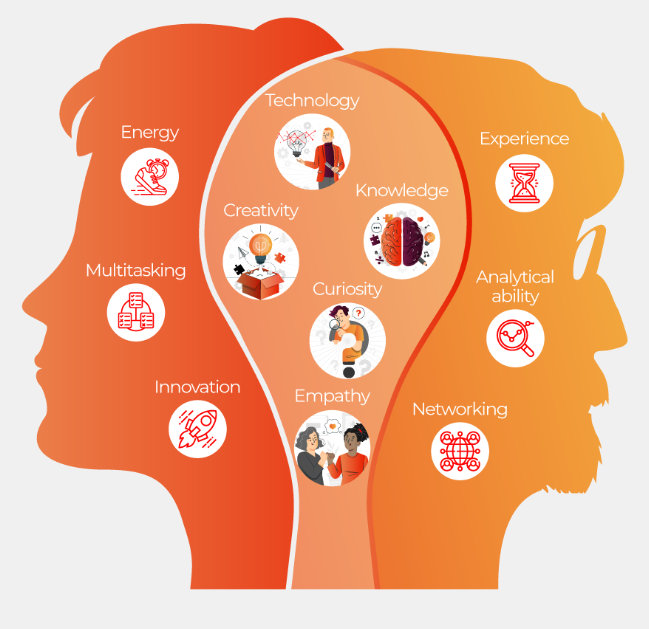
Source: https://people.acciona.com/
Gen Z is rewriting the rules of work—and HR needs to keep up. To attract and retain this digitally native, purpose-driven generation, HR must go beyond perks and policies. Here’s a comprehensive guide to what works:
What HRs Can Do to Attract Gen Z?
Showcase Purpose and Values
Gen Z wants to work for companies that stand for something.
- Highlight your mission, social impact, and sustainability efforts
- Share employee stories that reflect your values
- Involve Gen Z in CSR and DEI initiatives from day one
Offer Flexibility and Autonomy
Rigid schedules are a deal-breaker.
- Provide remote and hybrid work options
- Focus on outcomes, not hours
- Let employees choose how and where they work
Create Growth Opportunities
Gen Z craves learning and career mobility.
- Offer mentorship, coaching, and upskilling programs
- Use personalised learning platforms and certifications
- Promote internal mobility and transparent career paths
Build a Digital-First Experience
They expect tech that works as smoothly as their favourite apps.
- Use AI-powered recruitment tools and mobile-friendly HR platforms
- Streamline onboarding with interactive, gamified modules
- Provide collaboration tools like Slack, Notion, or Teams
Emphasise Diversity, Equity & Inclusion
Gen Z won’t settle for lip service.
- Showcase diverse leadership and inclusive policies
- Update recruiting materials to reflect DEI commitments
- Create safe spaces for identity and expression
Strengthen Employer Branding
They research before they apply.
- Maintain an authentic presence on LinkedIn, Instagram, and Glassdoor
- Share behind-the-scenes content and employee testimonials
- Use storytelling to connect emotionally
What HRs Can Do to Retain Gen Z?
Provide Continuous Feedback
Forget annual reviews—Gen Z wants real-time input.
- Use pulse surveys, peer reviews, and manager check-ins
- Encourage upward feedback and open dialogue
- Turn feedback into visible action
Support Mental Health and Wellbeing
They’re the most stressed generation at work.
- Offer mental health days, therapy access, and wellness stipends
- Normalise conversations around burnout and stress
- Train managers to spot and respond to emotional needs

Foster Inclusion and Belonging
Retention thrives in psychologically safe environments.
- Launch employee resource groups and allyship programs
- Celebrate diverse holidays and identities
- Encourage team bonding across generations
Make Career Paths Transparent
They won’t stay without a roadmap.
- Share clear promotion criteria and skill benchmarks
- Host internal mobility fairs and job shadowing
- Let employees co-create their development plans
Gamify Engagement
Keep things fun and interactive.
- Use leaderboards, badges, and challenges for learning
- Celebrate milestones with digital rewards
- Create friendly competition around innovation or wellness
Model Authentic Leadership
Gen Z respects vulnerability and transparency.
- Host “Ask Me Anything” sessions with leadership
- Share personal stories and lessons learned
- Be honest about challenges and company direction
SFT Evolve: A Gen Z-Ready HRMS
Enter SFT Evolve—a trailblazing HRMS designed to thrive in today’s workplace revolution.
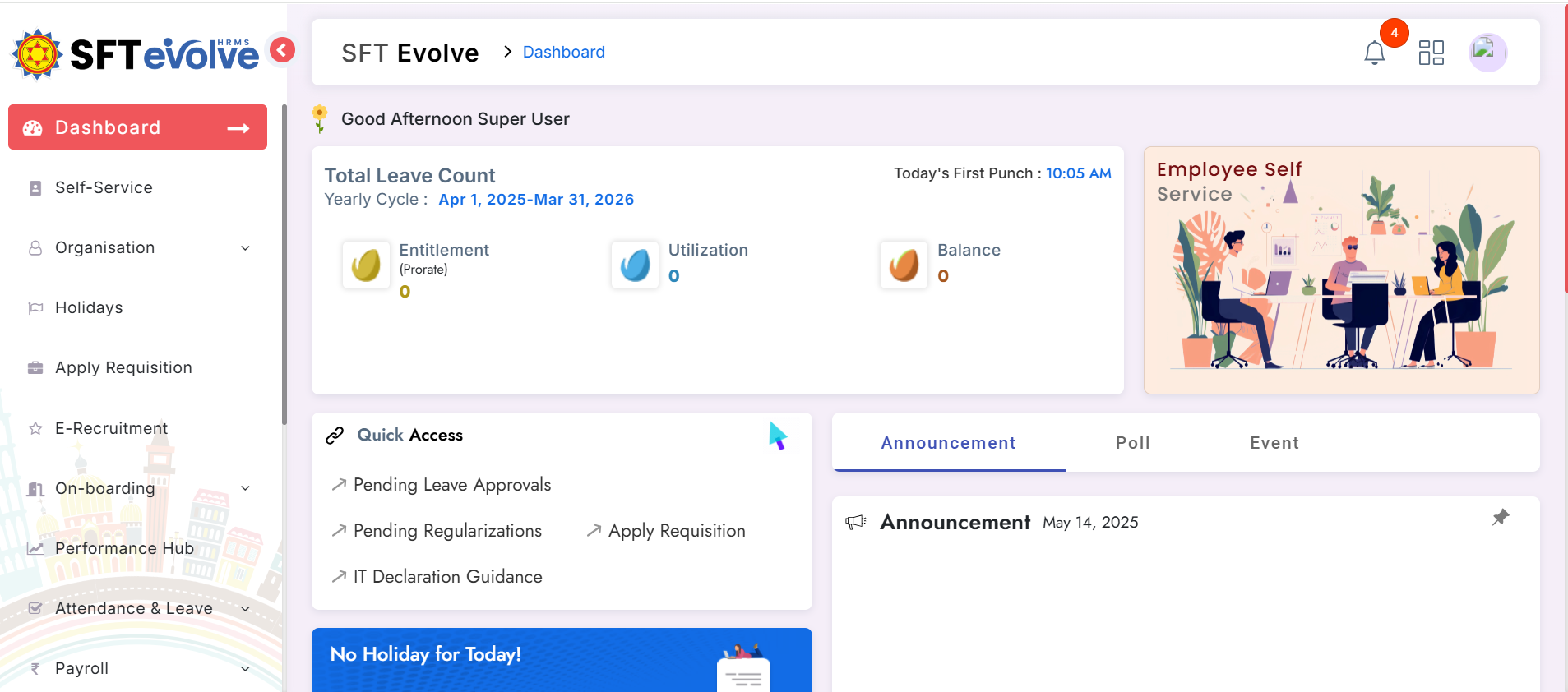
Key Features:
- Mobile self-service with intuitive UI/UX
- Onboarding journeys built for engagement
- AI-powered feedback and performance tools
- Learning systems designed for micro-skilling
- Real-time data dashboards for HR teams
Also Read: Future of HRMS: How AI and Machine Learning Are Reshaping Human Resource Management Systems
How SFT Evolve Aligns with Gen Z?
- 24/7 accessibility from any device
- Clear pathways for career development
- Tools for social collaboration
- Recognition and rewards platform
HR Software in India, like SFT Evolve, bridges the gap between legacy expectations and Gen Z’s digital-first mindset—empowering HR teams to lead transformation rather than react to it.
How Can an Efficient HRMS Retain and Engage Gen Z Employees?
An efficient Human Resource Management System (HRMS) is no longer just a backend tool for payroll and attendance—it’s a frontline engagement engine, especially when it comes to connecting with Gen Z. This generation expects more than just a job; they want experiences, transparency, flexibility, and a sense of purpose. With Gen Z becoming a significant part of the Indian workforce, organisations must adopt HRMS platforms that speak their language, quite literally and digitally.
- Convenience with a Mobile-First Approach
Firstly, a mobile-first approach is essential. Gen Z employees live on their smartphones, and a responsive, intuitive interface is non-negotiable. An HRMS that allows them to access their payslips, apply for leave, track attendance, and even communicate with HR via chatbots empowers them with autonomy and immediacy. When systems feel clunky or outdated, engagement drops fast.
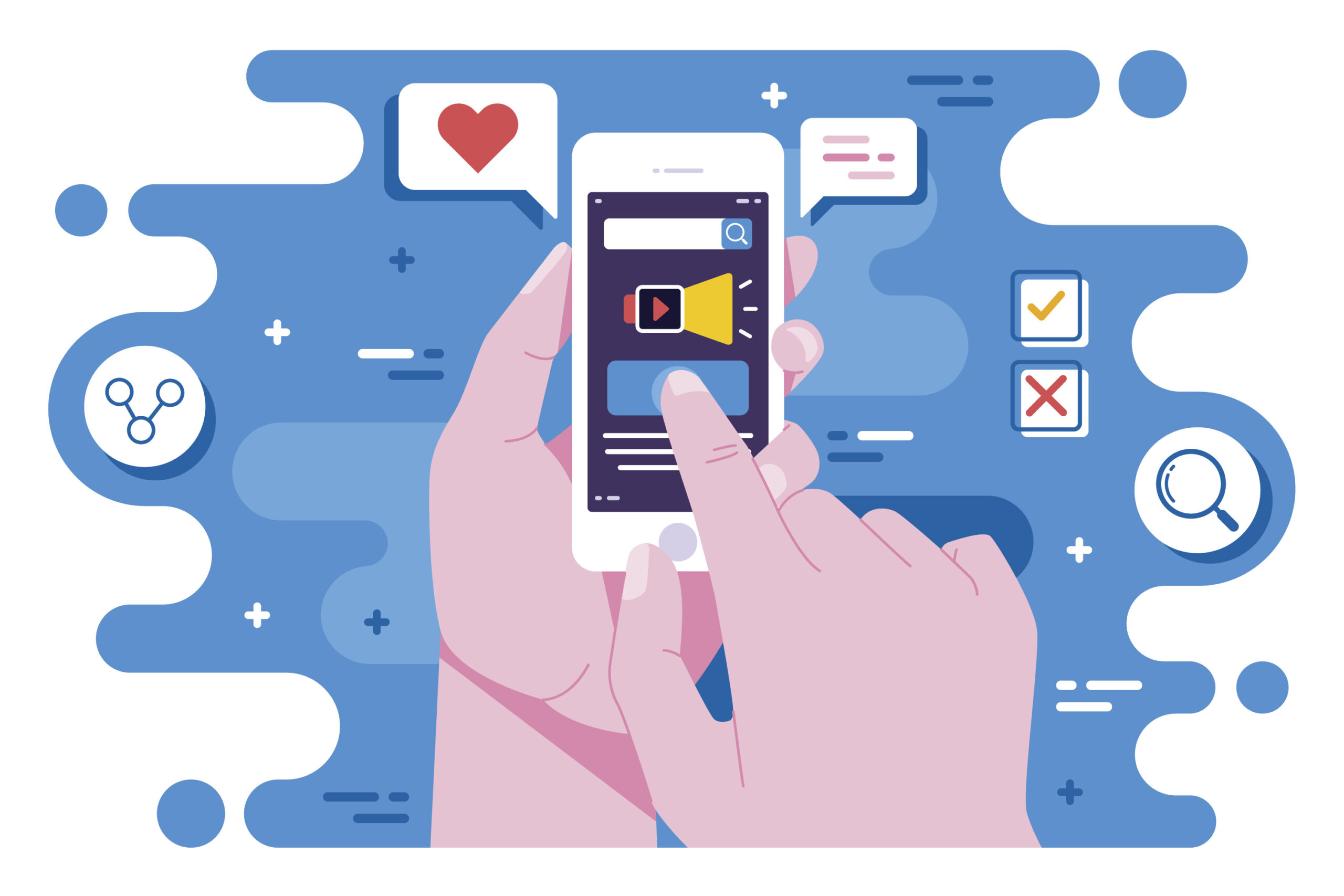
- Real-time Feedback and Recognition
Recognition and real-time feedback are other game-changers. Gen Z thrives on timely acknowledgement and continuous performance input. HRMS platforms that incorporate tools for peer-to-peer recognition, manager feedback, and agile goal tracking promote a culture of growth and belonging. It’s not about waiting for annual reviews anymore—it’s about creating a feedback loop that reinforces progress and potential every single day.
- Personalised Learning and Career Growth
Career growth is another pillar of Gen Z retention. A smart HRMS offers personalised learning recommendations, tracks certifications, and maps career paths that align with individual interests and capabilities. When employees see that their future within a company is visible and achievable, they’re far more likely to commit long-term.
Mental health support and wellness integration are now non-negotiable features. Gen Z is vocal about the importance of emotional wellbeing. Efficient HRMS platforms offer tools such as wellness check-ins, burnout trackers, and easy access to mental health resources. By making wellbeing a visible priority, companies foster trust and psychological safety, key drivers of employee retention.
- Flexibility with a Hybrid Work Structure
In a hybrid work environment, flexibility is king. Gen Z prefers remote and asynchronous work models that allow autonomy. HRMS systems must accommodate remote attendance, virtual onboarding, and seamless integrations with popular collaboration tools, such as Slack or Microsoft Teams. When work feels adaptable, Gen Z feels empowered.
- Inclusivity Is the Catchword
Inclusivity is another cornerstone. HRMS platforms with DEI dashboards, anonymous feedback forms, and support for multiple languages help Gen Z employees feel seen and respected. These systems should also facilitate the creation of employee resource groups and provide safe spaces for diverse identities to thrive.
Ultimately, data-driven insights enable HR teams to stay one step ahead of the competition. A smart HRMS uses analytics to predict disengagement, identify rising talent, and personalise employee experiences. This proactive approach makes HR more strategic and human-centric, exactly what Gen Z appreciates.
Platforms like SFT Evolve are already leading the charge with Gen Z-centric design, flexible workflows, and powerful engagement tools. They don’t just manage resources—they shape culture. And that’s the kind of impact Gen Z is looking for.
In Conclusion:
Gen Z isn’t just another generation—they’re a movement. HR teams that embody their values, communicate authentically, and foster flexible and inclusive cultures will not only attract top talent but also inspire loyalty and innovation. Suppose your organisation in India is still relying on outdated tools or rigid processes. In that case, it’s time to future-proof your workplace.
Upgrading to a modern HR Software in India, such as SFT Evolve, isn’t just a smart move—it’s essential for talent retention, engagement, and sustainable success. Whether you’re a startup or a legacy enterprise, SFT Evolve delivers everything your team needs to build a vibrant, Gen Z-friendly culture.
Ready to evolve your HR strategy? Visit SFT Evolve and discover how to reimagine HR for the next generation.








